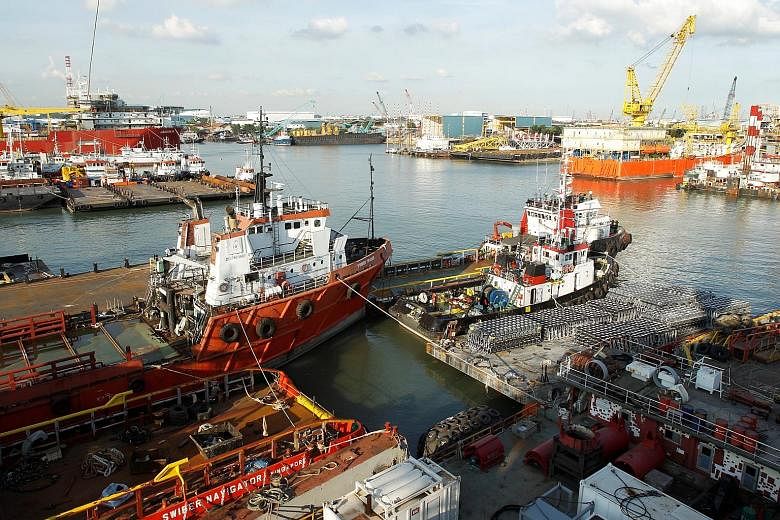Ratings agency Moody's said the three local banks may not have made enough provisions against potential losses from their loans to the hard-pressed oil and gas sector.
The warning comes as offshore services company Swiber Holdings defaulted on a coupon payment due on Tuesday, after filing to be placed under judicial management late last week.
DBS Bank last Friday also revealed it would increase provisioning for loan losses to half of its $700 million exposure to Swiber.
Moody's said in a report yesterday that these developments are "credit negative", noting that DBS's 50 per cent provisioning level in this case far exceeds the 20 per cent in losses that the three banks currently see on their oil and gas loans.
"This situation indicates that the current provisioning they make on their oil and gas exposures could prove inadequate, and that the current low credit costs on their oil and gas exposures will rise faster than we had anticipated," it noted.
Singapore's three biggest lenders - DBS Bank, OCBC Bank and United Overseas Bank (UOB) - are the main financing sources for offshore services companies here.
-
Feb 29, 2016: Swiber announces full-year net loss of US$27.4 million (S$37 million) for 2015, its first loss since listing. July 8: Swiber says completion of its US$710 million offshore field development project in West Africa will be delayed owing to "weakness in the oil and gas sector". It adds that it faces US$4.76 million in outstanding demand letters and is seeking legal advice. July 11: Swiber says London-based private equity firm AMTC did not subscribe to US$200 million preference shares in its wholly owned unit Swiber Investment.
July 25: Swiber says it faces $15.2 million in outstanding demand letters, up from US$4.76 million announced previously.
12.58pm, July 27: Swiber halts trading of shares. No reason is given. Last traded price is 10.9 cents.
1.04am, July 28: Swiber announces it filed a winding-up application on July 27. More letters of demand have been received; total is now US$25.9 million as of July 26.
1.33am, July 28: It announces that vice-chairman Francis Wong, director and chief financial officer Leonard Tay, and executive director Nitish Gupta have resigned.
8.36am, July 28: Provisional liquidators ask for trading of shares to be suspended.
July 29: It announces suspension of trading of all its outstanding bonds; letters of demand have now swelled to US$50.5 million.
Says it has applied to discharge its provisional liquidators and filed to be placed under judicial management instead, after a major financial creditor indicated that they are supportive of judicial management instead of liquidation.
Aug 1: Provisional liquidators announce Swiber is unable to pay its coupon payment due Aug 2.
Aug 3: Put into interim judicial management; winding-up application withdrawn.
Moody's said DBS' substantial upward revision in its provision for its Swiber exposure shows that the deterioration in the oil and gas industry could have a much stronger impact on bank bottom lines.
Under a severe stress scenario, DBS would be the worst hit among the three banks, said the report.
It noted that close to 60 per cent of DBS' pre-provision income for the second half of this year could be eroded by loan loss provisions while adding a full percentage point to its non-performing loan (NPL) ratio. OCBC and UOB would see losses of 40 to 50 per cent.
Moody's added that it could not rule out "the risk of a broader default of a loss severity akin to Swiber", given that it sees the company as representative of the weak financial state that is prevalent across the oil and gas industry.
Separately, analysts from JPMorgan Chase & Co have also questioned DBS' ability to handle non-performing loans.
"The core tenet of DBS' investment thesis is the bank's ability to tide over ongoing NPL cycle better than peers due to shifts in underwriting practices since 2009," said analysts in a report on Wednesday.
"The abrupt downgrade of $700 million exposure to Swiber challenges that confidence."
The JPMorgan analysts cut their rating on DBS from neutral to overweight and recommended investors sell the bank's stock ahead of its second-quarter earnings release next Monday.
Asked by The Straits Times for comment on the report, OCBC said that its group chief executive Samuel Tsien had said at the bank's results briefing last week that the 30 to 40 per cent of the specific provisioning it has taken over the last three quarters are for loans to the oil and gas support services sector.
OCBC's NPL ratio for oil and gas loans rose from 7.1 per cent at the end of March to 7.5 per cent.
But Mr Tsien added that the group takes a "stringent view in our modelling". "Once it is a substandard asset, we will then assess how much specific provisioning is required by discounting the future comfortable cash flow that the company has, the future value of the collateral, if there's collateral, take a haircut on the collateral, and then decide whether it is still able to cover the loan outstanding. If it does not, that difference is then put into specific provisioning."


